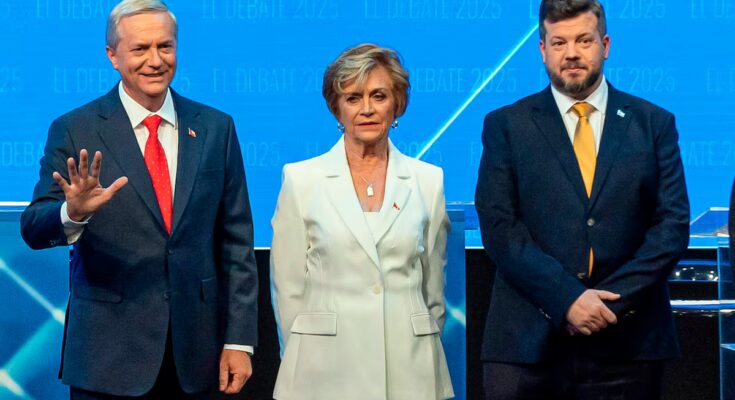The Chilean right faces these presidential elections in a scenario that is as unprecedented as it is paradoxical. For the first time since the return to democracy, it is on the verge of reaching a historic majority in Congress, but has decided to divide itself into two parliamentary lists: on the one hand, the traditional right gathered in Chile Vamos; on the other, a more radical alliance between the Republican Party, the National Libertarian Party and the Christian Social Party. Instead of consolidating a position of strength, the sector has opted for dispersion, and this decision could become a decision boomerang this weakens their chances of victory and makes it easier for leftist forces to take advantage of the disorder. It is not just a tactical difference: the fragmentation reveals an open hegemonic dispute, in which the toughest groups aspire to dethrone Chile Vamos from its role as natural articulator of the right and to reorder the internal correlations of the bloc.
The result is a contest between three candidates that appeals largely to the same electorate. Since it is unlikely that anyone will gain a large advantage in the first round, the eventual configuration of a right-wing government will depend both on the results obtained in the presidential elections, on the parliamentary results and, above all, on the subsequent talks. An industry victory would not automatically clarify this landscape. Rather, it would anticipate a complex cycle: the need to heal the wounds of the electoral campaign, resolve ideological tensions and manage an internal diversity that today seems more of a threat than an opportunity.
Faced with this picture, it is worth asking how this tripartite division of the right-wing camp occurred. The first explanation lies in the growing fragmentation of the party system after the 2015 electoral reform, which reduced barriers to entry and opened space for new political organizations. The weakening of party identity, added to compulsory voting, has encouraged part of the electorate to lean towards emerging projects or figures strangers which appear as “the new”. These are not necessarily ideologically innovative proposals, but rather a strategy of capitalizing on discomfort, where freshness is confused with rupture and rupture with radicality. Giovanni Sartori anticipated it decades ago: competition in fragmented systems pushes elites to take their discourse to the extreme, to show doctrinal rigidities which in many cases do not translate into programmatic feasibility. Chilean politics, historically characterized by the search for consensus, is today put to the test by a style that rewards differentiation rather than articulation.
Added to this is a second factor: the emergence of the far right in response to the erosion of the moderate right. The so-called “new right” promoted during the first government of Sebastián Piñera, which wanted to distance itself from Pinochetism and embrace liberal human rights causes, soon encountered internal resistance. Symbolic measures such as the criticism of “passive accomplices”, the closure of the Cordillera prison or the promotion of the Agreement on married life have rekindled old doubts. For the most difficult sectors it was the testimony of a right that had lost its identity, which gave in on issues considered essential to preserve order and tradition. The signing of the Agreement for a New Constitution consolidated this perception. That ideological void was quickly filled by actors willing to offer a clearer, more rigid and more confrontational alternative.
This confluence of factors explains the discursive radicalization that dominates internal competition today. Although the candidacies of Evelyn Matthei and José Antonio Kast share general diagnoses – security, growth, fiscal order – they differ substantially in the intensity of their proposals. Kast adopts tougher positions, especially on security – where he proposes measures such as a state of siege – and on migration, an area in which, in addition to initiatives that are difficult to implement, he even proposes the closure of borders. From an even more extreme position, Johannes Kaiser pushes the edges of what can be said by advocating the “closing of the 1973-1990 chapter” and possible pardons that would imply forms of impunity for criminals with extended sentences. This movement towards the margins – that liberation of political language – activates a centrifugal effect: it forces moderate actors to respond, puts the sector’s agenda under tension, and creates incentives for radical authenticity over programmatic rationality.
Radicalization also has electoral benefits. This explains why part of the electorate perceives Kast as a figure of coherence, especially in the face of a weakened government and the growing feeling among citizens that the democratic system does not respond to the most pressing problems. And it also helps to understand the emergence of Kaiser, whose program is the only one that explicitly develops a “cultural battle” against “gender ideology” or globalism, appealing to mobilized and highly ideological niches. The far right, far from being homogeneous, also competes to define what it means to be right-wing today: Kast seeks to institutionalize itself and occupy the space of old conservatism, while Kaiser pushes the limits to differentiate itself and cultivate an anti-systemic epic. The center-right, by giving up part of its authoritarian legacy without building a new and solid narrative about order, has left a discursive void that others have filled more effectively.
In this context, Kaiser becomes the key figure in the elections and the main unknown in the process. Your vote will not only influence the outcome of the first round, but also the tone of any subsequent negotiations. The internal balance of the right will depend on how much moderation, radicalism and maximalism will weigh at the polls. What is at stake is not only who governs, but which right emerges from this cycle: the one capable of articulating diversity to build majorities or the one trapped in its own centrifugal competition.
The conclusion is inevitable: the Chilean right arrives divided at an election that it could have faced united from a position of strength. If it fails to organize its internal pluralism and transform fragmentation into strategic cooperation, it risks wasting a historic opportunity and confirming that, in politics, those with the most strength do not always win, but rather those who know how to lead it.


